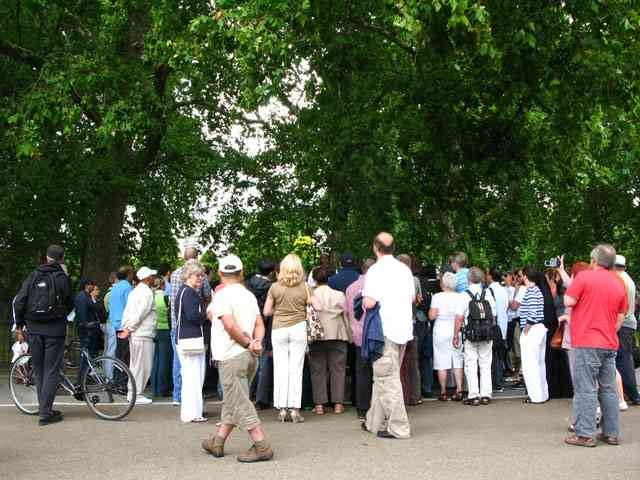Introduction: From Royal Ground to Religious Debate
Hyde Park’s Speakers Corner has long been a symbol of Britain’s free speech tradition, but today, it’s becoming something more a live, uncensored stage where some of the most intense ideological debates of the 21st century unfold. While once home to political revolutionaries and philosophers, its modern identity is increasingly defined by passionate debates between Muslims, Christians, atheists, and skeptics broadcast to millions around the world on YouTube.

What’s driving this shift? Why are Muslim speakers so dominant in these public discussions? And what does it say about the future of religious discourse in the digital age?
A Brief History of Speakers’ Corner
Originally formalized in 1872 as a legally protected space for public speaking, Speakers’ Corner grew out of a deeper culture of protest and open discourse in Britain. Located in Hyde Park’s northeastern corner, it was established following large demonstrations by the Reform League. Since then, it has hosted voices ranging from Karl Marx and George Orwell to civil rights activists and ordinary citizens with something to say.

But history alone doesn’t explain the energy of today’s Corner.
The Digital Revival: YouTube Made It Global
Over the past decade, Speakers’ Corner has exploded online. Dozens of YouTube channels such as SC Dawah, Smile2Jannah, Speaker’s Corner Highlights, and The Muslim Lantern have transformed this small patch of London into a global platform for da’wah (Islamic outreach), debate, and intellectual exchange.
Every Sunday, Muslims and non-Muslims gather to record intense debates about religion, morality, science, politics, and culture. Clips routinely go viral, sparking comment wars, reactions, and sometimes even conversions.
Why Muslims Dominate the Discourse at Speakers’ Corner
The strong Muslim presence at Speakers’ Corner isn’t simply due to organization or consistency. It’s something deeper rooted in the very nature of Islam itself.
1. Islam Encourages Questions and Provides Clear Answers
Unlike many faith traditions that may discourage challenging questions, Islam not only permits but encourages inquiry. From the earliest days of revelation, the Qur’an addressed doubts, posed rhetorical questions, and invited both believers and skeptics to reflect and reason.
Muslim speakers at the Corner often highlight this: Islam isn’t based on blind faith it stands on logical foundations, objective evidence, and rational arguments. Whether it’s about the existence of God, the authenticity of the Qur’an, or the life of the Prophet Muhammad (peace be upon him), Islam consistently offers responses that appeal to both the heart and the mind.
2. A Faith Built for Clarity and Consistency
Islam’s appeal at Speakers’ Corner lies in its intellectual clarity. The concept of Tawhid (the oneness of God) is simple yet profound. The Qur’an is preserved and accessible. The teachings of the Prophet are detailed and well documented. This structure allows Muslim debaters to articulate their views confidently, while often exposing contradictions in other ideologies.
3. A Divine Duty to Share the Truth
For Muslims, da’wah (inviting others to Islam) is not just a hobby or a debate for sport. It’s a spiritual responsibility. Speaking the truth, standing up for justice, and clarifying misconceptions about Islam are seen as noble acts rewarded both in this life and the hereafter. This inner drive produces a level of passion and consistency that’s hard to match.
Islam: A Clear Guide to the World’s Fastest Growing Religion
The Popular Faces You See Every Week
Some of the recurring names who’ve become staples at Speakers’ Corner include:
- Mohammed Hijab – known for debating academics and atheists with philosophical depth.
- Ali Dawah – charismatic and media-savvy, often focusing on Christian-Muslim debates.
- Shamsi – leads Salafi Dawah and emphasizes traditional Islamic theology.
- Hashim – known for his calm demeanor and encyclopedic knowledge of the Bible and Qur’an.
- Paperboy – often defends Christianity and engages with Muslim speakers in long-form discussions.
Each of these figures has amassed thousands even millions of views online, with debates often continuing on social media long after the Sunday crowds leave the park.
Topics That Dominate the Corner
While religion is the dominant theme, here are the hottest recurring topics:
- Is Jesus God or a Prophet?
- Trinity vs. Tawhid
- Islam vs. Atheism
- Science in the Qur’an
- Sharia and Women’s Rights
- Western Morality vs. Islamic Values
These aren’t shallow soundbites. Some debates stretch for over an hour, with detailed back and forths that blend theology, history, science, and politics.
Tensions, Challenges, and Criticisms
Speakers’ Corner isn’t always peaceful. There are moments of real tension verbal abuse, crowding, and sometimes even physical altercations. The police maintain a visible presence, especially during larger gatherings or when controversial speakers show up.
Critics argue that some speakers (on all sides) exploit the platform for online fame rather than sincere dialogue. Others believe that debates get repetitive or devolve into shouting matches. Still, it remains one of the few places in the Western world where open, unscripted religious debate is allowed and protected.
Why It Matters: A Pulse on Modern Belief
In an age of censorship, cancel culture, and algorithm controlled feeds, Speakers’ Corner offers something rare unscripted, public dialogue. It’s not sanitized for TV or moderated by institutions. It’s messy, raw, and often uncomfortable but that’s what makes it powerful.
For Muslims, it’s also a sign of rising confidence in representing their faith publicly, especially in the heart of a Western capital. For others, it’s an opportunity to challenge, question, or affirm their beliefs in real time.
Conclusion: A Park, A Platform, A Mirror
Speakers’ Corner may be just one corner of a park in London, but it’s become a global symbol of the clash and coexistence of ideas. It reflects a world in search of truth, meaning, and identity. And while not every debate ends in agreement, every voice added to the mix contributes to a larger, ongoing conversation about who we are and what we believe.


